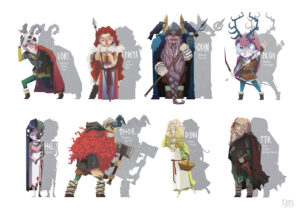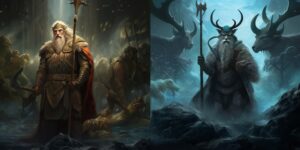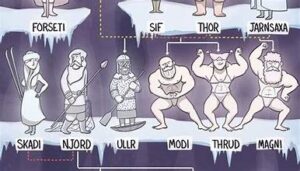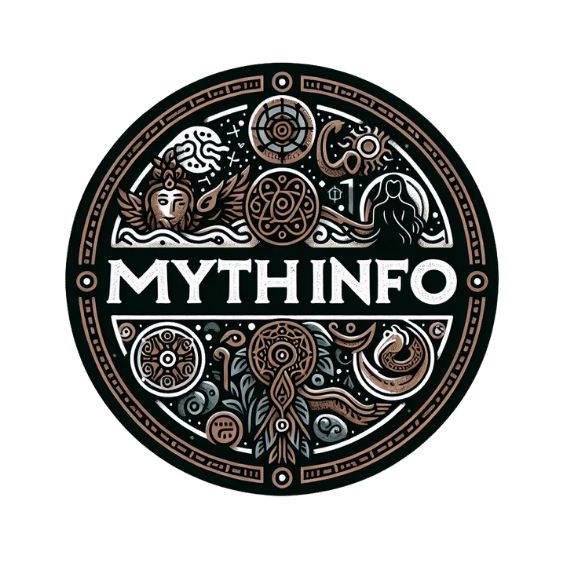
Norse mythology, with its rich tapestry of gods, giants, and epic tales, has long captivated the human imagination. From the ancient sagas of the Vikings to contemporary films and television series, the gods of Asgard have undergone a remarkable transformation in popular culture. This article explores the evolution of Norse gods, tracing their journey from ancient legends to their modern-day portrayals in media, while also examining the reasons behind their enduring appeal.
1. Origins of Norse Mythology
Norse mythology originates from the ancient Scandinavian and Germanic traditions, particularly from the Viking Age (circa 800-1100 AD). The primary sources of these myths are the Poetic Edda and the Prose Edda, written in Old Norse and compiled in Iceland in the 13th century. These texts detail the gods of Asgard, including Odin, Thor, Loki, and Freyja, and their intricate relationships with each other and with the world.
Key Deities:
- Odin: The All-Father, associated with wisdom, war, and death.
- Thor: The thunder god, known for his strength and his hammer, Mjölnir.
- Loki: The trickster god, whose actions often lead to chaos and conflict.
- Freyja: The goddess of love, fertility, and war.
2. Early Depictions in Literature and Art
In the early years, Norse gods were primarily depicted in oral traditions and runic inscriptions. These early representations were largely symbolic, reflecting the gods’ roles and attributes. For example, Thor’s hammer was frequently used as a symbol of protection and power.
During the 19th century, interest in Norse mythology surged with the rise of Romanticism. Writers and artists like Richard Wagner and J.R.R. Tolkien began to reinterpret Norse myths, blending them with their own creative ideas. Wagner’s operas, particularly “Der Ring des Nibelungen,” brought Norse mythology to a wider audience, albeit with significant artistic liberties.
3. The 20th Century Renaissance
The 20th century marked a significant turning point for the portrayal of Norse gods. The rise of comic books and graphic novels introduced these ancient figures to new generations. Marvel Comics, founded in 1939, played a crucial role in this transformation.
Marvel’s Influence:
- Thor: Created by Stan Lee, Larry Lieber, and Jack Kirby in 1962, Marvel’s Thor was a modern reimagining of the Norse god. He was portrayed as a superhero with a magical hammer, fighting villains in contemporary settings. This portrayal cemented Thor’s place in modern popular culture.
4. Norse Gods in Modern Media
As we moved into the 21st century, Norse gods continued to evolve in popular media, reflecting changing societal values and technological advancements.
Film and Television:
- Marvel Cinematic Universe (MCU): The MCU, starting with “Thor” in 2011, brought a high degree of visibility to Norse gods. Chris Hemsworth’s portrayal of Thor became iconic, blending traditional mythology with modern superhero tropes. The success of these films led to spin-offs and further integration of Norse mythological elements in popular culture.
- Television Shows: Series like “Vikings” and “The Last Kingdom” explored Norse mythology and history, focusing on both legendary figures and historical events. These shows highlighted the complexity of Norse beliefs and their impact on Viking society.
Video Games:
- God of War (2018): This game reinvigorated interest in Norse mythology by reimagining Kratos, the protagonist, as he confronts Norse gods in a beautifully crafted virtual world. The game’s depiction of Norse mythology was both respectful and innovative, contributing to the broader cultural conversation.
Literature and Comics:
- Neil Gaiman’s “Norse Mythology” (2017): Gaiman’s retelling of Norse myths brought a contemporary voice to the ancient stories, making them accessible to a new generation of readers. His work demonstrates how traditional myths can be reinterpreted for modern audiences while retaining their core essence.
5. Cultural Impact and Legacy
The portrayal of Norse gods in modern media reflects broader trends in how societies engage with their cultural heritage. By adapting ancient myths into contemporary formats, creators make these stories relevant to today’s audiences while also exploring themes of power, identity, and morality.
Popular Culture and Identity:
The fascination with Norse gods in modern media also speaks to a broader cultural interest in exploring ancestry and heritage. For many, these myths offer a connection to a distant past and a sense of identity. This is evident in the popularity of Viking-themed festivals, historical reenactments, and merchandise that celebrates Norse mythology.
Educational Value:
The resurgence of interest in Norse mythology through modern media also serves an educational purpose. It encourages people to learn more about ancient cultures, their beliefs, and their impact on contemporary societies.
6. Challenges and Criticisms
While the modern portrayals of Norse gods have been largely positive, they are not without their challenges and criticisms. The adaptation of ancient myths often involves creative liberties that can lead to misunderstandings or distortions of the original stories. Additionally, the commercial success of these portrayals can sometimes overshadow the cultural and historical significance of the myths themselves.
Maintaining Authenticity:
Creators must balance the need for entertainment with respect for the source material. This involves careful research and sensitivity to the cultural context of the myths being adapted.
Cultural Appropriation:
There is ongoing debate about cultural appropriation and the commercialization of mythological elements. Ensuring that adaptations are both respectful and informed is crucial in maintaining the integrity of Norse mythology.
Conclusion
The evolution of Norse gods from ancient legends to modern media illustrates their enduring appeal and adaptability. From the sagas of old to the superhero movies of today, these deities continue to captivate and inspire. As they navigate new formats and audiences, they remain a testament to the power of storytelling and the universal themes that connect us across time and culture.
In celebrating the Norse gods through various media, we not only honor their ancient origins but also explore their relevance to contemporary society. Their journey through popular culture reflects both our fascination with the past and our ongoing quest to find meaning in the stories that shape our world.

